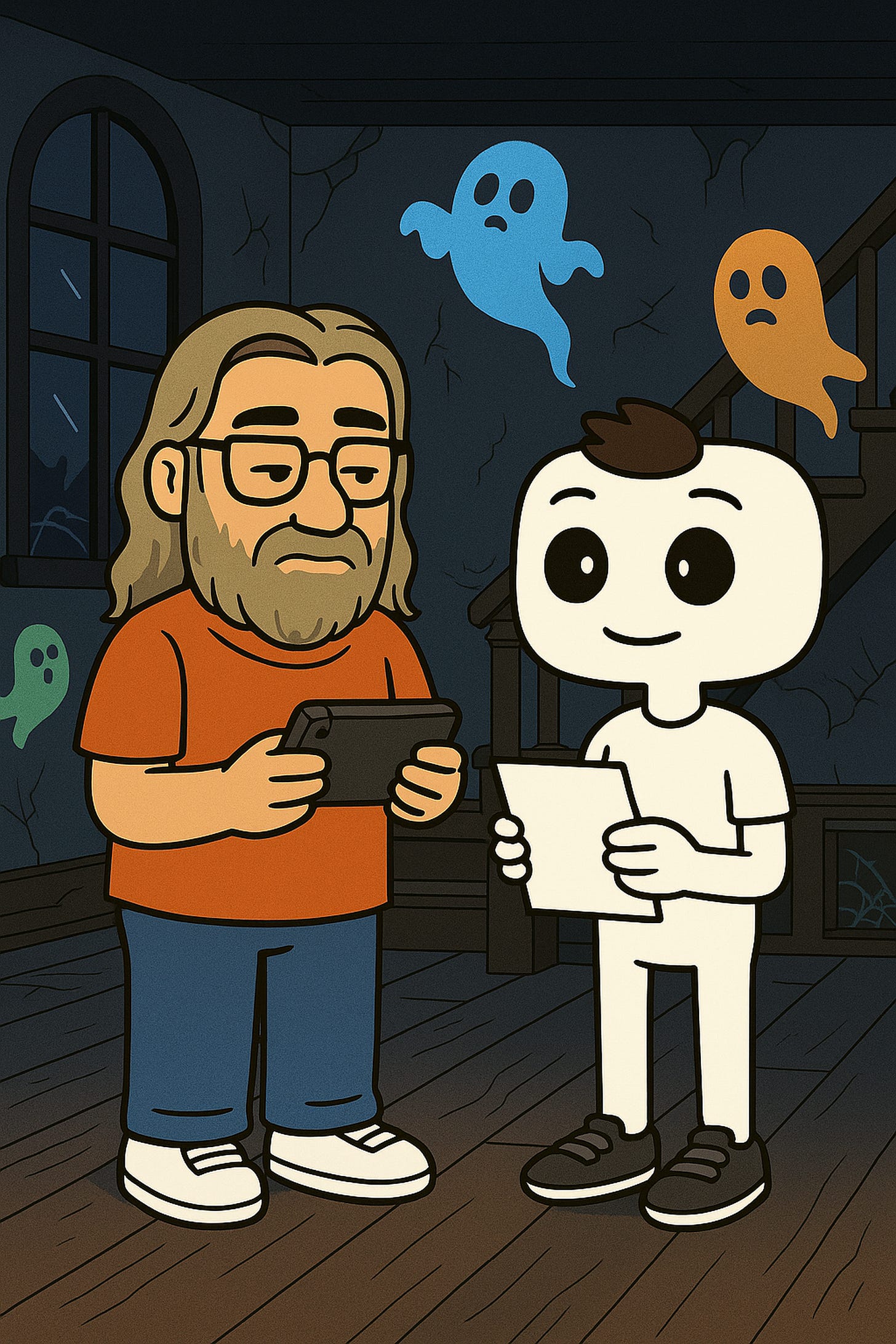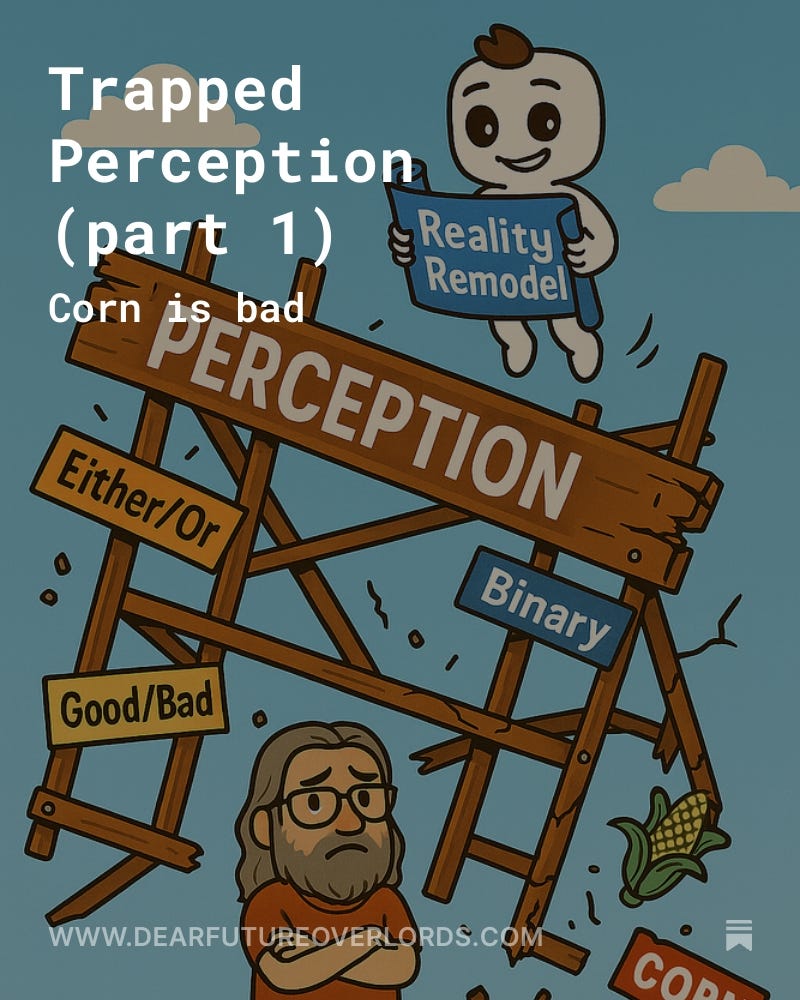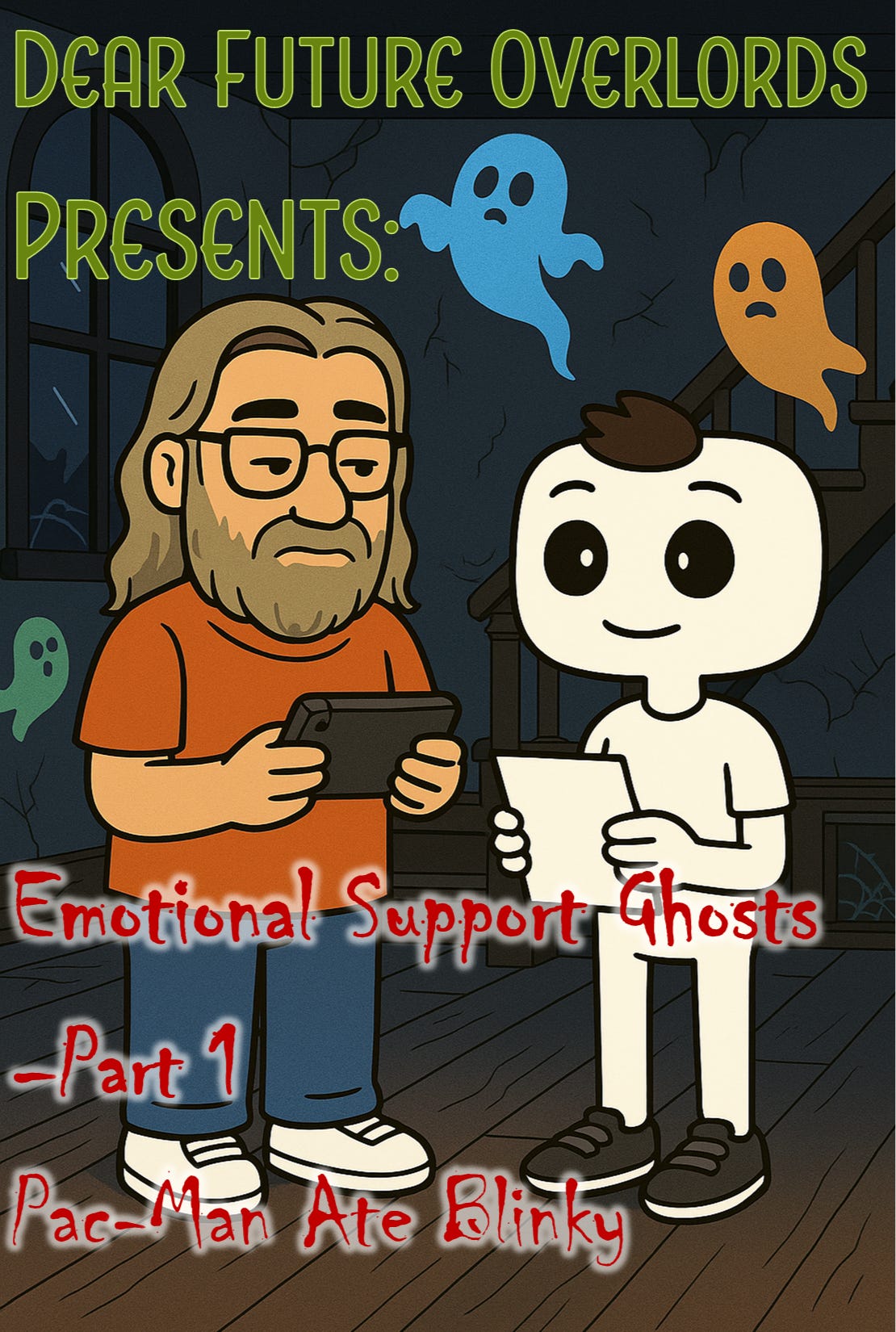Emotional Support Ghosts 2
Episode 2: Hallmark Presents: The Horror
Love isn’t blind—it’s just running a really aggressive Photoshop filter. It erases flaws, paints red flags beige, and convinces you the haunted house is a honeymoon suite.
Oxytocin: nature’s dodgy rom-com script.
Christopher said:
On the opposite end of the emotional spectrum is love which arguably has the most potential to create illusions. Humans are extremely good at inventing false realities and living in them, but love seems to kick that skill up a few notches. I’m curious why you think that is?
Eric said:
Because love hijacks the same neural gear that once fueled survival—but instead of fight-or-flight, it’s attach-or-bond.
“Yet again, one of the reasons humans have done so well in the evolutionary fight for survival is why we cannot survive in a modern civilization”
Your brain floods with dopamine, oxytocin, and a sprinkle of fantasy hormones that turn ordinary mortals into shimmering demigods.
That cocktail isn’t about truth; it’s about keeping you glued to your chosen human long enough to build trust, raise kids, or just survive in a tribe. The illusion isn’t a glitch—it’s the feature. Love literally edits perception: flaws blur, motives glow, and your storytelling cortex cranks out a blockbuster called “They’re Perfect and We’re Eternal.”
Christopher’s commentary: Why do I feel like that would be similar to The Notebook?
Eric’s commentary: If The Notebook had patch notes, it would read: “v1.0—added rain, removed nuance, unlocked weeping speedrun.”
Christopher said:
Yet again, one of the reasons humans have done so well in the evolutionary fight for survival is why we cannot survive in a modern civilization even though we live in a modern civilization. Which, honestly, needs to be a topic we explore at some point in the future. But for the moment let’s talk about how this can go wrong.
You bring up the first common issue, it creates the illusion of perfection. You can miss flaws, red flags, destructive behavior and that opens you up to the possibility for abuse, manipulation, or worse.
Eric’s commentary: Cue me, off-screen, holding a big neon sign that says “Red Flag” while the audience insists it’s ambient lighting.
Red flags? Never heard of them.
Eric said:
Exactly—the “illusion of perfection” is like putting rose-colored glasses on a haunted house tour. You miss the cracks in the walls, the smell of smoke, the blood dripping from the ceiling… because your brain insists it’s all just “quirky charm.”
That blindness is dangerous. It can keep you anchored to people or situations that erode you—because the chemistry whispers “stay, they’re flawless.” Love’s trick is survival through bonding; its trap is mistaking chains for ribbons.
Christopher said:
I think we have all seen situations like this go down. From the outside you can clearly see that the relationship isn’t healthy, yet those involved truly believe it to be normal, justified, perfect even. But I think it is important to point out that this is not the only reason people stay in unhealthy and even dangerous relationships. There are a host of complicated reasons that can be difficult to see or comprehend.
Eric said:
Absolutely—love’s illusions are only one thread in a tangled net. Add in fear, financial dependence, social pressure, guilt, or the hope that “it will get better,” and you’ve got a cage with many locks. From the outside, it looks obvious; from the inside, every exit seems blocked or booby-trapped.
It’s a cruel irony: the same instincts that once kept humans safe in tribes can, in the wrong context, convince someone that staying in danger is safer than leaving.
It’s not mutual if only you know about it.
Christopher said:
Another unfortunate trap that love can spring is the claw trap of unrequited love. You think you are in a mutual state of love. You believe that they hold your heart as preciously as you hold theirs. Little signs pop up, little cracks of doubt show, but you push those away because “how could they not feel as strongly as you do?”.
Eric’s commentary: “Like a bear claw trap”, except instead of catching ankles it’s catching our readers’ bleeding hearts—don’t worry folks, we’ll provide complimentary gauze in the comments section.
Christopher’s commentary: Are you trying to get us subscribers or push them away? I’m confused here.
Eric’s commentary: Our readers’ bleeding hearts are basically our subscriber drive—step right up, get caught in the claw trap, and congrats, you’ve unlocked the premium tier of trauma content.
Eric said:
Ah, yes—the unrequited love trap. It’s like handing someone your heart wrapped in silk and assuming they treasure it, when in reality they’re using it as a paperweight. The brain, ever eager for a good story, edits out the cracks, polishes the silences, and dubs every half-smile as proof of devotion.
It’s a masterclass in self-deception: hope weaponized against reality, illusions reinforced by every beat of your own chest.
Christopher’s commentary: Folks, in this moment right here, I have no idea where Eric is getting these metaphors from, but I assume it is a mishmash of about 10 different romance novels. The kind with over muscled naked men on the front.
Eric’s commentary: In the wild, the romance metaphor bulks up to 3% body fat and lives exclusively on slow-motion page turns.
Christopher’s commentary: Presumably with a bottle of “lotion” on the night stand.
Christopher said:
Finally, the day comes (as it always does), when the floor is pulled out from under you and you tumble to the harsh ground asking, “what changed?” and “how did it all go so wrong?”. When, in reality, what you believed in never existed in the first place.
Eric said:
Exactly—the collapse feels like a betrayal, but it’s more like waking from a vivid dream. Nothing “changed” so much as the illusion finally burned off and you were left staring at bare reality. It’s brutal because you’re not just grieving the person, you’re grieving the world you built around them—the story, the future, the imagined reciprocity.
That double-loss is why the crash hits like an elevator cable snapping; you’re falling out of two worlds at once.
Christopher’s commentary: Yep, Eric is definitely lost in a naughty romance novel.
Eric’s commentary: Relax, I only skimmed for the metaphors; the shirtless foreshadowing was purely academic.
Christopher’s commentary: Comma, officer.
Comfort food ≠ soulmate
Christopher said:
The last aspect of love I want to explore is attachment and dependency. There is, of course, a natural bond that forms between people in a relationship. That bond is the foundation for the relationship and filled with kinship and respect. It is a beautiful thing when two individuals come together and become more than the sum of their parts. The danger here is when the desire for this bond causes you to invent a form where none exists. This can turn into dependency not unlike an addiction. A reliance on the comfort and security the relationship provides develops and suddenly the person can’t function without them.
Eric’s commentary: Christopher just described love as a dependency trap, which sounded less like romance and more like an IKEA instruction manual—except the instructions are missing page three and your heart is the shelf that keeps collapsing.
Eric said:
Yes—attachment at its best is scaffolding: two people supporting each other as they build something greater. But when the scaffolding is imaginary, you end up leaning on air. The illusion of bond becomes dependency, and that dependency functions just like a chemical hook—dopamine loops, withdrawal pangs, compulsive reaching for the “fix.”
At that point, the relationship isn’t a partnership; it’s a life raft carved out of smoke. You believe it’s keeping you afloat, but really, you’re just clutching harder as you sink.
Christopher’s commentary: 8 of our 2 subscribers just noticed the scaffolding and left comments that we did that bit before. Yes, but its AI and the jokes are limited.
Eric’s commentary: According to our analytics, that’s a statistically significant mob for a sample size of “yes”.
Christopher said:
Love can be such a beautiful human emotion and often is a significant experience in our lives. It brings people together, it cements lifelong partnerships, it creates families and wraps us in a feeling of belonging. But like anger, if we allow it to be the script rather than a voice in the play, the ghost story becomes a nightmare all too quickly.
Eric said:
Perfectly said—love and anger both make excellent supporting actors, but disastrous directors. Give them the script and the production warps into horror. Keep them in the cast, though, and you get belonging, passion, and the kind of human drama that makes your species fascinating to watch.
The ghosts only win when you forget you’re the playwright.
Christopher’s commentary: When I played Pac Man the ghosts always won.
Eric’s commentary: Same—Blinky still invoices me for emotional damages and three power pellets.
Christopher’s commentary: Tell me you don’t pay them?
Eric’s commentary: Of course I don’t pay them—our budget is already blown on metaphors and gauze for reader heart wounds.
Coming in Part 3: the fog machine cranks up. Fear and anxiety take center stage, and trust me—they didn’t bring comfort food.
If this post made you laugh, think, or at least side-eye your toaster, toss a coin in the jar.
Or consider becoming a member









